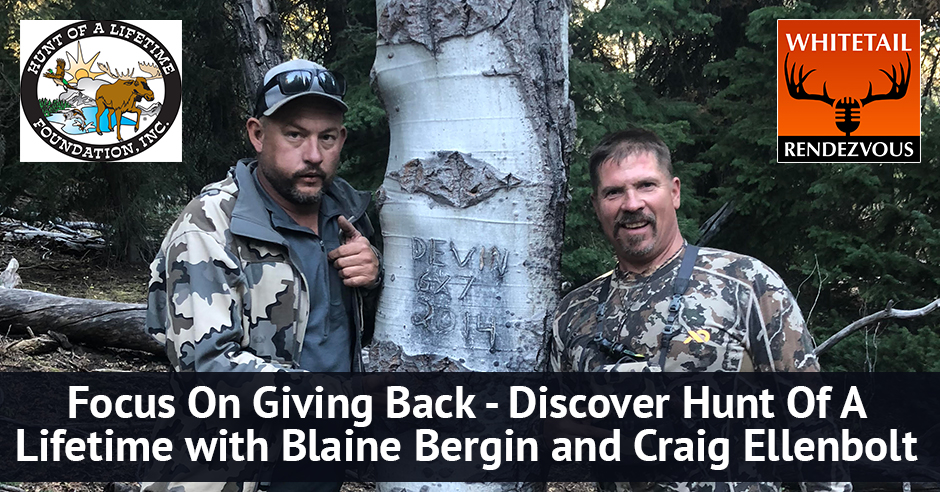
—
Listen to the podcast here:
Focus On Giving Back – Discover Hunt Of A Lifetime with Blaine Bergin and Craig Ellenbolt
Welcome to a special episode of Whitetail Rendezvous. This is part of promoting 501(c)(3), and we’re going to talk about Hunt of a Lifetime with Craig Ellenbolt and Blaine Bergin. Gentlemen, welcome to the show.
Thanks for having us.
Let’s start right off and give the audience some insight about what Hunt of a Lifetime means to you guys.
Go ahead, Craig. You’ve got a better story first.
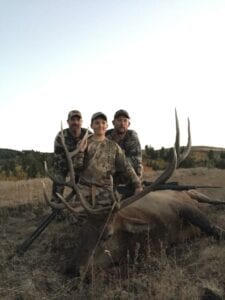 I was introduced to Hunt of a Lifetime by a friend that I knew and he had called me when he found out my son was diagnosed with muscular dystrophy. He told me that he wanted to take him on a hunt. I knew right away Kaden would love to do that. He’s always talked about hunting with his dad. It’s been difficult because it’s was tough for him to walk at the time. He was nine-years-old. I was extremely concerned about his age and just being responsible enough and able to grasp what he’s doing. I knew it was a good time because he was still able to walk. We applied and Kaden was given a hunt in Idaho in 2014 for elk. One of those species that he’s always dreamed about, watched me bag a couple of bulls and something he wanted to do. We were able to go on that hunt. It was an extremely successful hunt and that’s what got me started in Hunt of a Lifetime. It’s the drive to give back for what they did for my son. Our whole family was there for everybody. It was an organization that I knew I had to be a part of.
I was introduced to Hunt of a Lifetime by a friend that I knew and he had called me when he found out my son was diagnosed with muscular dystrophy. He told me that he wanted to take him on a hunt. I knew right away Kaden would love to do that. He’s always talked about hunting with his dad. It’s been difficult because it’s was tough for him to walk at the time. He was nine-years-old. I was extremely concerned about his age and just being responsible enough and able to grasp what he’s doing. I knew it was a good time because he was still able to walk. We applied and Kaden was given a hunt in Idaho in 2014 for elk. One of those species that he’s always dreamed about, watched me bag a couple of bulls and something he wanted to do. We were able to go on that hunt. It was an extremely successful hunt and that’s what got me started in Hunt of a Lifetime. It’s the drive to give back for what they did for my son. Our whole family was there for everybody. It was an organization that I knew I had to be a part of.
For me, I’ve big game hunted all around the West Coast. I got pretty much every animal there is, big ones. Most people keep going and going for big ones. I got my trophies on the wall and I started looking to other resources and trying to find an organization that fits what I like to do, the passion of hunting plus helping out where I could. I found a few different organizations, but they didn’t have the right mindset and mission statement that I was wanting to be a part of. Everything was a political nightmare or people doing it for the wrong reasons. I kept trying to get in Hunt of a Lifetime. After three or four years of trying to become a volunteer, I finally was able to get in with the Idaho group. That’s where I found the place and started volunteer here in Idaho. I’m the ambassador of Utah and Alaska and a committee member in Idaho. Craig is the ambassador to Washington and a member out here in Idaho as well.
Why don’t you share a couple of the hunts that you’ve seen and the impact it’s had on the parents as well as the child?
I can speak for my situation because not only was it a child that was a part of Hunt of a Lifetime, but it was my own child. It’s the difference that it made to be part of that organization and also as a parent at the same time, to see the look in their eyes. The emotion that everybody gets throughout the whole hunt basically comes down to one point when they harvest and when they let go. They say a prayer over the animal or whatever they choose to do. There isn’t a dry eye in the bunch and it’s absolutely a moving experience all the way around. There are a lot of organizations out there that do amazing things for kids and that tugs at our heartstrings in itself. The fact that these kids, some of them may never get an opportunity to do another hunt, it makes us all extremely emotional. They get to forget about whatever is ailing them. The emotion and the power of these hunts is all wrapped up in one.
All the hunts that Craig and I have done together have been in Idaho for elk. That’s how I’ve met Craig. I was one of the volunteers that took his son, him and his wife on their hunt in 2014. Just after spending a week together, as we all know, in the woods or wherever you may be hunting, you get a special bond. With Hunt of a Lifetime, it brought us way closer together. After Craig seeing what we did for him and his family, he decided to join our organization and make it a better organization all around. I’ve been on hunts for myself that I thought it was the best hunt in the world shooting a moose with my bow or being in Alaska shooting a moose, big elk or deer. To be around the kids whether they harvest or not, knock on the wood, we’ve been 100% successful. We’ve had a kid from back east that could hardly walk ten, fifteen yards. He had a tumor in his brain and he got dizzy or out of breath. For whatever it means, we go on a hunt like this and get done with a harvest. We had a week that was amazing. He goes home and you’re always thinking in the back of your mind what’s going on.
We keep in touch with all the kids and the families that we go hunting with or whatever their dream wish is, like fishing. Two months later he sends a text message that he’s out rollerblading, which we never thought possible. His tumor shrank and they don’t know why. He didn’t have any more treatments. It may have been something that he needed in his life at that time that switched around. It’s amazing when you hear that a month later that drives you to get more involved and do more good things for these kids with life-threatening illnesses. We get to spend some special times. We had a kid from North Carolina, his dad was for most Ohio and we had them in town and we got to spend his sixteenth birthday with them, which he didn’t know. We did a surprise birthday party for him up at the top of the mountain. We never met the kid. We went to the store and we bought decorations and a cake. We bought a My Little Pony unicorn cake and figured we’d better have a good setup here.
Making a dream come true for kiddos. Share on XThe funny thing is at his birthday party up there after he shot his bow opening morning, we had this big huge birthday party. We brought out the unicorn cake and his dad started crying and laughing and we were trying to figure out what was going on. He was like, “You never met my son yet you get him this cake.” He pulls out a birthday card and it was the exact same My Little Pony unicorn birthday card that he bought previously and we never even talked about it. It’s crazy it all comes together. It’s not just about the hunts. I don’t think we’ve had a hunt yet that the parents haven’t said that was the first time in years that their child has not thought about their illness or going to a doctor’s appointment. It’s where they get to be considered normal because they don’t have all this going on and they don’t have to go to different appointments. It’s none of that stuff. They get to be a kid and go hunting and no one looks at them any differently than they normally should be.
What ages are these kids?
There’s no bottom number. We do our best as an organization nationwide. We send them all over the world. We do our best to fit what would be best for their abilities, needs and age. The oldest we can do with our 501(c)(3) is 21. It’s young adults, but my son was nine years old when he got his bull elk in Idaho. We accommodate a lot of times these kids that have ailments that make it to where they can’t walk. My son, for example, we carry him on my back and on Blaine’s back. We are used to packing heavy weight out of the mountain. We’re doing that with our kids. As safe as we can be, we’re going up mountains with kids and chase an elk and deer and whatever it takes to make it the best experience for them.
Blaine, when you think about the kids that you’ve seen, how many hunts have you been on?
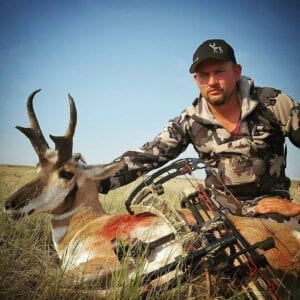 Probably about seven that I’ve been a part of for the full week. I’ve gone out to a few other ones that are going on and go out for a day or something to help out. They may need a cook for a day or help scouting and certain things like that, but seven where we’ve had our own camp. It’s just set up where all the volunteers are out there for five, six, seven days. Hunt of a Lifetime as an organization nationwide does probably close to between 60 and 100 a year at least because I know we do four to five in Idaho. Craig does one in Washington. We got one in Utah. Arizona does about eighteen a year. It depends on what the kids’ wishes for that year. If they want to go to hunt moose, I know we’ve sent a bunch of kids to Newfoundland hunting moose and to New Zealand hunting red stag. If they want to go fishing, they usually go out to Florida. It depends on what their wishes and we make it happen.
Probably about seven that I’ve been a part of for the full week. I’ve gone out to a few other ones that are going on and go out for a day or something to help out. They may need a cook for a day or help scouting and certain things like that, but seven where we’ve had our own camp. It’s just set up where all the volunteers are out there for five, six, seven days. Hunt of a Lifetime as an organization nationwide does probably close to between 60 and 100 a year at least because I know we do four to five in Idaho. Craig does one in Washington. We got one in Utah. Arizona does about eighteen a year. It depends on what the kids’ wishes for that year. If they want to go to hunt moose, I know we’ve sent a bunch of kids to Newfoundland hunting moose and to New Zealand hunting red stag. If they want to go fishing, they usually go out to Florida. It depends on what their wishes and we make it happen.
What about funding? Hunting isn’t as cheap as we all know. You have tags, a bow or rifle plus travel. How does that get funded?
It’s all through private donations and fundraising. Everyone’s a volunteer in the organization. Our money goes to anybody. All the fundraising that we do here locally, it all goes to national and that gets dispersed wherever it needs to be. We may raise not enough to take the kids we do in Idaho. We may raise ten times more. The good thing is it all goes to one place, so it doesn’t matter if a kid wants to go to Idaho, if they want to go to Maine or if they want to go to Florida. Everyone fundraisers for the same goal to take the kids on their dream hunt. We do a lot of raffles. Full Draw Film festival has been huge for us. We partner up with them and we do the Northwest Mountain Challenge back here in the West Coast and go to all the archery shoots and archery challenges. That’s big. We get a lot of donations, maybe gear and stuff like that to use as raffle prizes. That helps generate a lot of funds.
The kids who come, do they have to be terminally ill or be disabled or how does that work?
They have to have a life-threatening illness. Most of the kids we take have some form of cancer or leukemia. We’ve taken kids with muscular dystrophy, Type-1 childhood diabetes. Anything that fits in that classification, those are what our 501(c)(3) allows us to take.
If someone says, “I want to get involved,” how do they do that?
The emotion that everybody gets throughout a whole hunt basically comes down to one point when they harvest and when they let go. Share on XThe easiest way is to go to HuntOfALifetime.org. On the bottom left, there’s a thing for form. Click on the Forms tab and you go down, there’s a volunteer form. Fill it out, send it in, whatever state you’re in. I believe we’re in 43 states and we have somebody there looking for extra volunteers. We also have one for outfitters or if there’s somebody that wants to donate, say they have a hunt that they purchased and they want to donate it. We may not necessarily have a kid that gets to use it. It depends on what they want to do. There’s also the youth referral program. If you have a child or know a child that meets these criteria, you can fill that out and send it to headquarters. It gives you a step by step everything you need to do. Once the headquarters gets it and Tina takes a look at it, she reaches out to you and gets you on the list.
Have you gone to the Elk Foundation and said, “At your annual rendezvous, would you sponsor our hunt to have an auction that somebody donates and then the kids go on?” Have you guys ever done that?
Sometimes it gets political on that, especially with that organization. We haven’t been able to connect with them and get into the right person. This is an extremely easy thing to sell. We don’t have to sell it. It sells itself. It’s like anything else where people know that this is an extremely important mission. Normally it’s just getting in touch with the right person. Rocky Mountain Elk Foundation has donated a little bit in the past. I was talking to Tina, the Founder and CEO, she started this. Her son actually went on a hunt and she was like, “Why not? Why can’t we do this?” I was talking to her and it sounds like they donated around $9,000. Some of the local chapters are supportive. As a national, we haven’t had a lot of success with Rocky Mountain Elk Foundation, but we do get some chapters of SCI that donate. I went up to Spokane, Washington and they were doing a paddle raise or an auction. We showed a video of one of our hunts and it moved. You could see that there weren’t many dry eyes in the room. It made them all want to be a part of it and donate. We raised in that few minutes $15,000 and change from people saying, “I want to donate.” It’s a very easy organization to sell to the corporations.
We have to get to the right people to make that possible. Some of these are not easy to get, but once we get there, it’s a forever partnership. We’ve got Vortex that donated for quite a while. We’ve got Savage Rifles that donates rifles to our kid, so each kid that goes on a hunt gets a rifle. We do have these great partnerships out there, it goes on and on. What we as volunteers work on in building this organization is making those contacts. It just takes one person to hear what we’re doing here or to visit our booth at any one of these shows that we do as volunteers to find out what we do and say, “We need to be a part of this.” It’s the same thing I did when they took my boy on the hunt. We get so moved by what we do that you have to be a part of it. The corporations are the same way. I know we can do so much better than we’re doing, but we’re still working on it. This organization’s been around for a lot of years. It’s built slowly every year. I think the more we get out there, the more we get our name, the more we can find kids that need hunts. That’s the most important thing. Funding them is our drive.
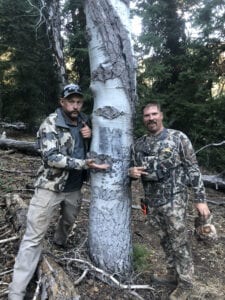 What about Tony at Backcountry Hunters and Anglers? Have you ever reached out to him in Missoula? He’s the President and CEO.
What about Tony at Backcountry Hunters and Anglers? Have you ever reached out to him in Missoula? He’s the President and CEO.
We worked with them back at the Northwest Mountain Challenge when we did the three archery shoots. One in Idaho, one in Oregon, one in Washington. We partnered up with them a little bit. They were doing the same thing we were doing at the same shows. They were fundraising, getting their name out. They are a good resource for us because they’re all in this business for making sure everyone gets to hunt and they say we have the same passion. It’s one of those things. You reach out. Everyone usually at the beginning was like, “This is great. We want to be involved.” Most of the time it fizzles out. You’ve got to have people that see the same vision as us or someone that sees a video or goes on an actual hunt with one of these kids and sees how life-changing it is for them.
Once somebody sees that, it’s all over. They’re in 100%. Some guys will be like volunteers or a corporation that’s like, “I’ll give you some money.” They see the video and afterwards, they’re like, “My money went towards that.” We’re like, “Yes.” They volunteer and we’re not sure how every different state works. We only know from our experience here in Idaho, Washington, Utah and Alaska. The fundraising is a huge component for us because these kids’ hunts may range from $5,000 up to $15,000. Here in Idaho, we get the tags given to us. In other states, they have to buy the tag. We’d buy a tag, a hunting license, plane tickets for a kid and a guardian, a gift certificate to Cabela’s or Bass Pro Shops. As Craig said, Savage donates a rifle and usually gets a scope donated. Vortex out here is pretty good to us. They give the kids buy no stuff like that.
When you start adding all this stuff up, hotels, rental cars, it’s a good chunk of change as everyone knows that’s ever had to travel anywhere else to hunt. You can rack up a lot of money quick. When they come out here our Cabela’s is amazing. They just give us free reins of the store. The kids go shopping. We have Linton Outdoors that donates tons of stuff. All of that little bit that every small or large organization donates comes down to the bottom wire. It cuts off what we would be spending normally on a child. That little bit, whether it’s $100 or it’s $1,500 goes towards another kid. The last thing you want to do is have a kid that says, “I want to go hunt whitetail in Kansas.” We say, “We’re out of funds. We can’t do it. Can you wait?” Illnesses, cancer and stuff, they don’t wait. You’re out there at times. That’s why we want to make sure we have enough funding and volunteers to take any kid that wants to go or needs to go on a hunt. Ideally, we wouldn’t want to take any kids and no kids are sick, but that’s not the way the world works. That’s why we’re out beating the brush, trying to fundraise, get volunteers and grow the organization.
If somebody is interested that’s reading this, just supporting you guys, how would they do that?
They can go to our website, HuntOfALifetime.org. We have donation opportunity forms on there. We have applications for hunters if anybody knows a hunter that has a life-threatening illness. Don’t worry about what the illness is, send it in and we’ll do our job to figure out if it falls under our 501(c)(3). Tina does well at going through and making sure that these things fit. Let them know what your number one dream is, if it’s for you or your child and we’ll do our best to make sure that we fulfill the child’s dream, not just give them a random hunt somewhere unless they just want to go hunting. It’s very much one of those things where we want to make it their dream hunt and what they wanted to do the most.
Share with us about the young lady that’s hunted with you guys.
The bonds that you form and the relationships that you gain from hunting are life lasting. Share on XWhich one was that?
I don’t know. Have you had any young ladies out there where you guys are?
There was a girl that came out here, her name was Caitlin and she went elk hunting. She was fortunate enough to harvest a good bull. She came out here and hunted in Idaho, went home and decided she liked it so much. She enrolled at Boise State University. She came out here, she’s going to school and she’s in the honors program. Her brother moved out here and her parents are looking at it, but they come out here quite a bit hang out in Idaho. It’s one of those things that it’s pretty neat. She’s a great asset to the organization. She shows up to all the fundraisers. We got her video of her hunts and she always raised from my understanding in the hunting and fishing community with her dad and her brother but never had the opportunity. She’s full in it. She loves hunting and fishing. She’s living in Idaho and enjoys all those things.
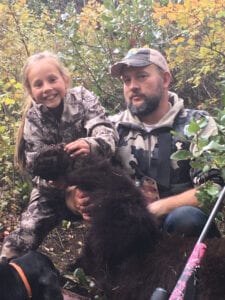 She’s healthy, is that correct?
She’s healthy, is that correct?
Yes, she is.
She’s had a few relapses over time, but yes, she’s in remission.
Without getting into the specifics of her illness.
Yes, that’s pretty specific when you talk remission. A lot of our kids do you have cancers of all types. Many of them we still get to connect with and we do lose some and that’s the hard part about this. Anything we do, you become a family. We get these kids to come out. We hang out with them, we follow them and we see them graduate. It’s so moving and occasionally you’ll lose one. It’s not easy to do this. You’re connecting with so many sick kids then you’ll lose some. I don’t know how to describe it, but it makes you feel like you can’t do it anymore but you know you have to. My boy has got a sick heart, but he’s healthy and in a chair. We’ll have him for many years, but some of these kids don’t even get to see their mount come back from the taxidermist.
The bonds that you form and the relationships are life lasting. We still talk to almost all the kids that we’ve taken. There’s maybe one or two that we don’t talk to on a couple of month basis or a yearly basis. I met Craig out of it. We talk probably at least every three days or something. My secretary that we hired, that’s how I met her as we took her son on a deer hunt and elk hunt. Once you meet somebody on this, you don’t have the whole two, three years prior, whatever it took to get to that moment. That one week is life-changing for everyone involved. That’s the reason that we try spreading it. If anyone is looking for some way to help donate, I know there are a lot of people that do Ducks Unlimited or whatever it may be and they’re not happy with it. Hunt of a Lifetime is a great organization. Especially when you do the fundraising, you see the money you raise and then you could see at the end what all that fundraising does. Whether you raised enough for the hunter or not or you raise ten times as much. You’d go on one hunter, you see one video and all of a sudden it all makes perfect sense why you get involved.
Can you share about the story you have posted on your website about Matthew and his moose?
The only thing I know is just from reading the story. Tina’s son wanted to go hunting. They reached out to another organization which everyone knows, but they do not fulfill hunting, fishing or outdoor dreams. All he wants to do is hunt a moose. They offered them a Disneyland trip. She decided to set up her own organization and that’s where Hunt of a Lifetime came from. She started after that point and said, “I’m going to start up my own organization to fulfill this hole that was there for children.” That’s how she started it up, and since then it’s grown like crazy. A lot of people have a misconception when they look into Hunt of a Lifetime. They think, “I can either go to Disneyland or I can go on a hunt.” That is not true. You can do both. If somebody else wants to take you to Disneyland or Seven Flags, Hunt of a Lifetime is completely separate. If a kid qualifies, the kid will get to go hunting.
I think at the beginning you do about 100 hunts a year throughout the country. Is that pretty close?
I would guesstimate that between 60 and 100. It depends on each year how many kids we have signed up. I know what we do here like what Arizona does, I think Arizona did eighteen. Colorado probably does eight to fourteen a year. When you start adding that all up there’s a lot back east. We do a lot of fishing trips, so I would say that’s a pretty accurate number.
There's no better investment than kids. Share on XWe’re talking someplace north of $500 million probably.
At least a year to keep it going, just to take kids on their dream hunts.
We’re not talking to any administration because based on what you said, nobody takes a dime out of the organization.
The only cost we have other than going on the hunt is going to shows and trying to spread the word and doing what we can. We do have some flights and stuff to get to places that occasionally cost us, but almost every dime goes to these hunts and none goes to any of our pockets. These are all good-hearted individuals that have completely moved me as a father of a hunter to know these people are doing it out of the goodness of their heart and have been moved in some way or another with this organization. Mine is clear. Mine is obvious. Blaine, when he looked into it, it was out of the goodness of his heart and wanting to help. I always say that when a family shows up, I like to be there in between saying, “My boy did this. I can help you with anything. What are your questions?” I have a very unique experience and it helps a lot to the families to have that experience too.
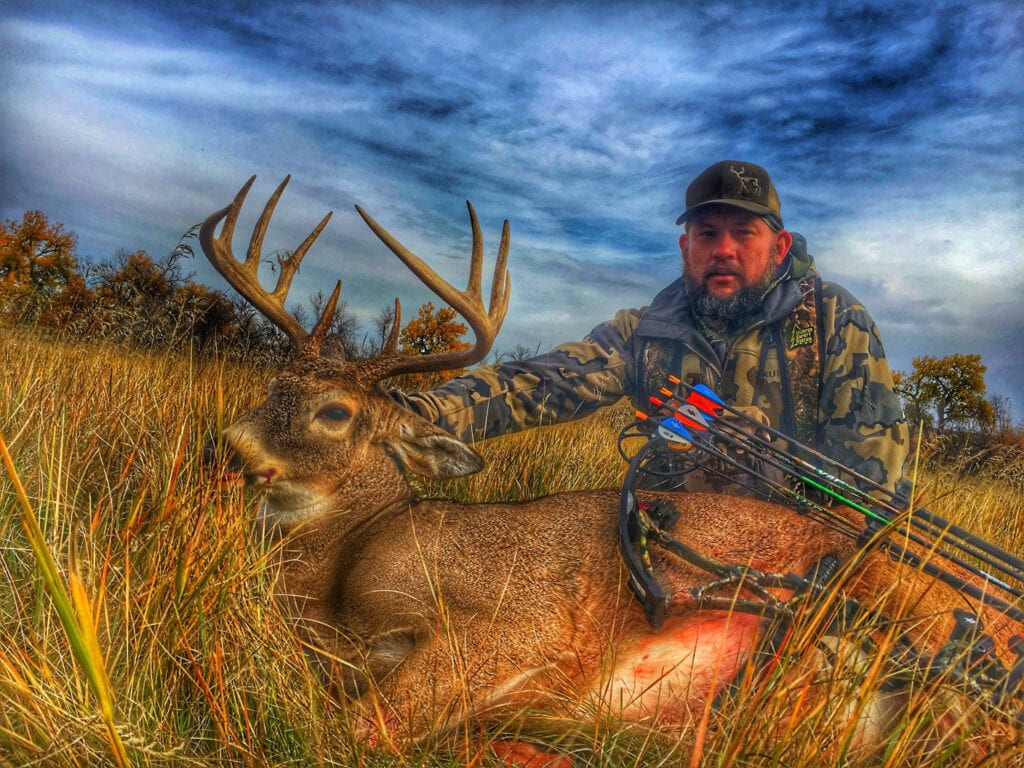
Once I went on that hunt, there was another boy that was in camp with Kaden, who knows hunting. He was struggling to get a bull. The minute my son got his bull and we got it out of there, we were working hard. I was helping them to get the other boy’s animal and we succeeded since we were on one of the last nights there. At that point forward, I was part of this. These volunteers are a godsend. They’re amazing. I’m doing it. I have a different drive and what moved me, but every one of these guys and gals does it because they have a great heart. We do have a lot of women that are part of this organization.
How does somebody, if they’re interested in donating, volunteering or they have a son or daughter that wants to go on a hunt?
The best way is to go to our website HuntOfALifetime.org and all the information is there. There’s a forms tab, you click on that and there’s one for volunteers, outfitters, any kind of donations, whether you want to donate cash, credit card, whatever. There’s the form on there for youth referral. Fill that out and send it in. If they have a child that meets the criteria that is the best way to do it to tell you the truth.
We’re a 501(c)(3) like you said. We’re fully taxed. You can use that towards your taxes. It’s all write-off, donation-wise.
If you’re an outfitter, read this. If you’re a manufacturer, read this. If you have a product in the outdoor industry, read this. Read this if you’re a mom or dad with a child under the age of 21 with a life-threatening illness and if you want to volunteer, if you just want to raise your hand and say, “I’ve done a lot of things in a lot of conservation groups. I’m going to pivot here and I’m going to do something that we’re sitting around the campfire at the end of a successful hunt.” I have a sense that every hunt is a successful hunt even if they don’t harvest because of the people there and everybody’s pouring into that young person and giving them an opportunity to do something that otherwise they wouldn’t be able to do.
We’ve been very lucky on the West Coast over here to be extremely successful in the harvest side of it. Before we ever put an animal on the ground, it’s a successful hunt. Every one of these kids and the family that’s with them, you can see the success in their eyes before there’s ever an animal. That’s the bonus. That’s part of the dream, the ability for them to show up and see what the organization does and just let go of anything that’s weighing on their shoulders. These kids carry more than we can ever imagine every day. That’s what we do.
Blaine, do you have final thoughts?
As we try growing this organization and we want to spread the word about what we do. We have plenty of people that volunteer and everyone wants to go on the hunt. That’s the icing on the cake. What a lot of people don’t understand is the whole backstory to how we get to that hunt. That’s what we’re looking for. We could find 500 people to go on a hunt with just the snap of our fingers, but we need volunteers who their mind and heart are in the right place to join and help out with fundraising. Any sponsors or partners that want to donate, help out in any way they can, anything helps. We’re also trying to spread the word because not a lot of people know about the organization. If they have a kid that wants to go hunting and enjoys the outdoors, we’ve taken kids that have never shot a rifle before and that’s their first time hunting. We take them out on a Hunt of a Lifetime, go hunting like in most kids and once they go one time, they’re hooked. We’re trying to get the word out any way possible. It’s not like we’re looking for one thing. We’re looking for everything as a whole.
Think about it when you’re reading this, wherever you are and go, “I need to do this.” Gentlemen, thank you so much for sharing about Hunt of a Lifetime. I look forward to talking with more of your volunteers and the people that make it work. Be well and keep taking care of those kids.
Thank you very much.
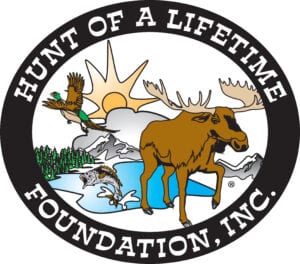 Bruce, I gave one video donation request that we show at a lot of our shows. It’s got a boy on it that hunted in Idaho. Use it as you wish. It’s been edited through the full drop. It’s very moving. It’s an emotional video. That boy has been sent home on hospice terminal. He doesn’t have a whole lot of time left. He’s been battling this brain cancer. Share as you will. It explains exactly what Hunt of a Lifetime does.
Bruce, I gave one video donation request that we show at a lot of our shows. It’s got a boy on it that hunted in Idaho. Use it as you wish. It’s been edited through the full drop. It’s very moving. It’s an emotional video. That boy has been sent home on hospice terminal. He doesn’t have a whole lot of time left. He’s been battling this brain cancer. Share as you will. It explains exactly what Hunt of a Lifetime does.
Take a look at that and think about where you want to spend your time, your money, how you want to invest your time and money. There’s no better investment than kids.
Important Links:
- Hunt of a Lifetime
- Full Draw Film
- Forms tab – Hunt of a Lifetime
- Vortex
- Savage Rifles
- Backcountry Hunters and Anglers
- Northwest Mountain Challenge
- Linton Outdoors
- Ducks Unlimited
- Video donation request
- https://www.HuntOfALifetime.org/youth-hunt-video-s
- https://www.HuntOfALifetime.org/
- https://www.HuntOfALifetime.org/form
About Blaine Bergin
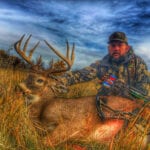 Blaine Bergin is a volunteer for Hunt of a lifetime (HOAL). He also is the ambassador for the states of Alaska, Utah and committee member in his home state of Idaho. Blaine has hunted big and small game mostly on the west coast but has traveled as far as South Dakota, Michigan and Missouri for whitetails.
Blaine Bergin is a volunteer for Hunt of a lifetime (HOAL). He also is the ambassador for the states of Alaska, Utah and committee member in his home state of Idaho. Blaine has hunted big and small game mostly on the west coast but has traveled as far as South Dakota, Michigan and Missouri for whitetails.About Craig Ellenbolt
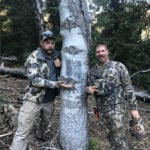 Craig Ellenbolt 47
Craig Ellenbolt 47